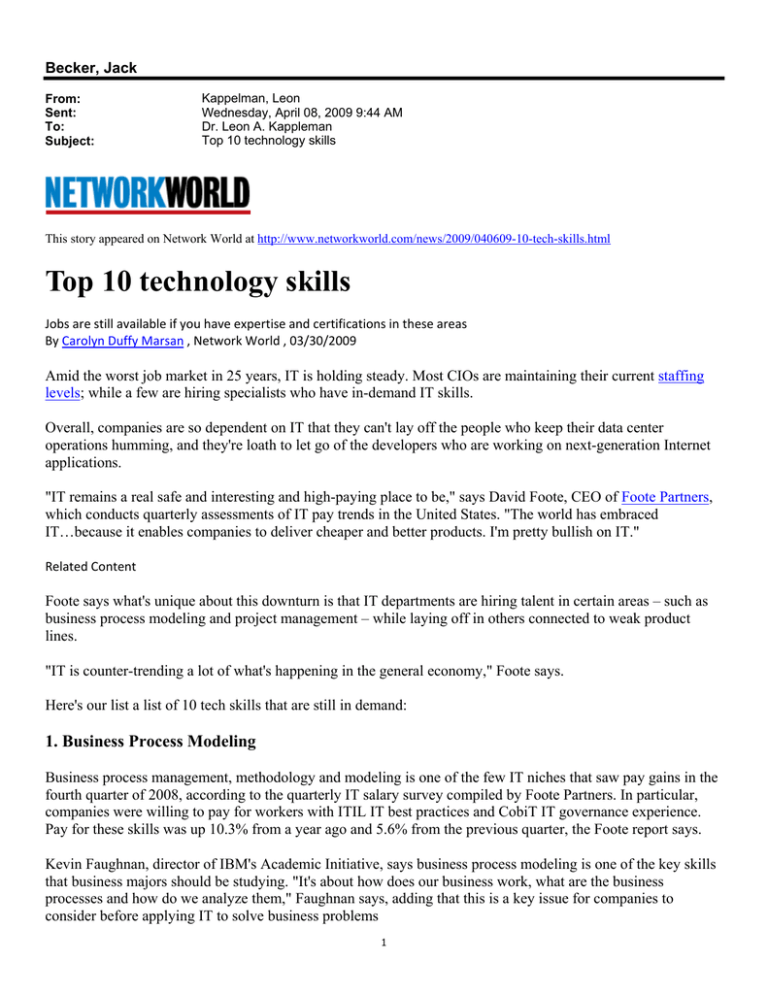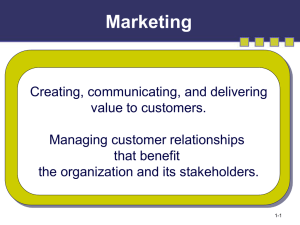Becker, Jack
advertisement

Becker, Jack From: Sent: To: Subject: Kappelman, Leon Wednesday, April 08, 2009 9:44 AM Dr. Leon A. Kappleman Top 10 technology skills This story appeared on Network World at http://www.networkworld.com/news/2009/040609-10-tech-skills.html Top 10 technology skills Jobs are still available if you have expertise and certifications in these areas By Carolyn Duffy Marsan , Network World , 03/30/2009 Amid the worst job market in 25 years, IT is holding steady. Most CIOs are maintaining their current staffing levels; while a few are hiring specialists who have in-demand IT skills. Overall, companies are so dependent on IT that they can't lay off the people who keep their data center operations humming, and they're loath to let go of the developers who are working on next-generation Internet applications. "IT remains a real safe and interesting and high-paying place to be," says David Foote, CEO of Foote Partners, which conducts quarterly assessments of IT pay trends in the United States. "The world has embraced IT…because it enables companies to deliver cheaper and better products. I'm pretty bullish on IT." Related Content Foote says what's unique about this downturn is that IT departments are hiring talent in certain areas – such as business process modeling and project management – while laying off in others connected to weak product lines. "IT is counter-trending a lot of what's happening in the general economy," Foote says. Here's our list a list of 10 tech skills that are still in demand: 1. Business Process Modeling Business process management, methodology and modeling is one of the few IT niches that saw pay gains in the fourth quarter of 2008, according to the quarterly IT salary survey compiled by Foote Partners. In particular, companies were willing to pay for workers with ITIL IT best practices and CobiT IT governance experience. Pay for these skills was up 10.3% from a year ago and 5.6% from the previous quarter, the Foote report says. Kevin Faughnan, director of IBM's Academic Initiative, says business process modeling is one of the key skills that business majors should be studying. "It's about how does our business work, what are the business processes and how do we analyze them," Faughnan says, adding that this is a key issue for companies to consider before applying IT to solve business problems 1 2. Database Database expertise is another area where pay is on the rise, up 2.9% in the last quarter, the Foote report says. Companies are looking for IT workers with experience in Microsoft SQL Server and the Oracle Developer Suite. They're also willing to pay for workers with database certifications such as the Oracle DBA Administrator Certified Master and the Teradata Certified Master, Certified Application Developer and Certified Design Architect, the Foote report says. Similarly, a 2008 CIO survey conducted by the Society for Information Management listed database skills as among the top skills for entry-level employees. Experience with databases was one of only four technical skills listed by CIOs, who favored soft skills such as collaboration, problem solving and communication in hiring recent college graduates. 3. Messaging/Communications Messaging and communications is the only other skill set that experienced a pay raise in the fourth quarter of 2008. Pay rose 2.8%, the Foote report says. Companies are particularly interested in hiring employees with experience in unified communications and messaging systems, which was among the highest paying IT skills in the Foote report. A related skill that also ranked among the highest paying was VoIP and IP telephony. 4. IT architecture CIOs are paying less for IT certifications than they did three years ago, but there are a few exceptions to this rule. One of them is IT architecture, which has seen a 10% rise in the value of certifications during the past year, the Foote report says. Foote says companies are looking to hire enterprise architects as well as system, network, application, data, information and security architects. Among the certifications rising in value are EMC Proven Professional Technology Architect, Security Certified Network Architects, Microsoft Certified Architects, SNIA Certified Architects, and the Open Group's IT Certified Architect. Related Content 5. IT security A slew of security certifications – including the CompTIA Security+, GIAC Security Essentials, Certified Ethical Hacker, GIAC Certified Incident Handler and Check Point Certified Security Administrator-- have increased in value in the past three months, according to the Foote report. "The value of security skills is going up, and jobs are pretty stable," Foote says, adding that many federal jobs are available for information security specialists with government security clearances Demand for security specialists is likely to remain strong because few teens are entering the field. Professor Peter Lee, head of the Computer Science Department at Carnegie Mellon University, sees a shortage in students studying security-related topics "We've seen a decline in interest in students who want to study security related to hardware architecture, operating systems and networks," Lee says. 6. Project management 2 The Project Management Professional certification remains in demand, the Foote report says. Even more important is experience managing complex IT projects and delivering results on time and on or under budget. SIM's 2008 CIO survey listed project leadership as one of the top 10 skills needed for mid-level employees. Project planning, including budgeting and scheduling, was also cited as well as project integration and management. "Project management skills are going to be more important over the next few years," says Henry Eckstein, senior vice president of strategic technology at York Insurance Services Group. Eckstein oversees a 50-person IT shop. "We have set up a corporate project management office. We are working on changing the corporate culture to do more project management and more IT governance." 7. Data mining Jobs are plentiful for workers who understand data mining and related fields such as information on demand, content management and unstructured information management, experts say. "The world revolves around data. Anything you can do to develop data analysis, data mining and information on demand skills is incredibly critical," IBM's Faughnan says. "There's a broad range of issues involved with managing very large amounts of data and being able to process it and extract knowledge from that data," CMU's Lee says. "One of the things we are starting to see from leadingedge places like Google is the need for graduates with the understanding and skill to cope in the new world of data intensive computing." 8. Web development Demand for employees with Web development certifications has plummeted in the past year, with the value for certifications in this area dropping 21.8% according to the Foote report. However, experts say there is still a need for developers who understand the latest Web trends, especially social media. "You've got to learn to manipulate data on the Web, and that includes Web 2.0. Mash-ups are becoming commonplace," IBM's Faughnan says. SIM's CIO survey listed programming and application development skills as key for entry-level employees, too. It was the highest ranked of the technical skills listed by CIOs. 9. IT optimization IT experts predict a solid future for IT professionals with experience in IT optimization, including virtualization and cloud computing. However, these jobs may end up in service providers, rather than IT departments. "Through software as a service, through cloud computing, CIOs may be doing less IT in house, but somebody is still going to be doing that. There will be a demand for more computer scientists in data centers," says Josh James, Director of Research and Industry Analysis for TechAmerica. 10. Networking 3 Although pay for networking certifications is down over the last six months, many remain on the list of the IT certifications earning the highest pay premiums, according to the Foote report. These include certifications from Cisco, SNIA, EMC, Brocade and Avaya. All contents copyright 1995-2009 Network World, Inc. http://www.networkworld.com ‐‐‐‐‐‐‐‐‐‐‐‐‐‐‐‐‐‐‐‐‐‐‐‐‐‐‐‐‐‐‐‐‐‐‐‐‐‐‐‐‐‐‐‐‐‐‐‐‐‐‐‐‐‐‐‐‐‐‐‐‐‐‐‐‐‐‐‐‐‐‐‐‐‐‐‐‐‐‐‐‐‐‐‐‐‐‐‐‐‐‐‐‐‐‐‐ Leon A. Kappelman, Ph.D. Professor of Information Systems Chair, SIM Enterprise Architecture Working Group Website: http://eawg.simnet.org/ Director Emeritus, Information Systems Research Center Fellow, Texas Center for Digital Knowledge College of Business, University of North Texas Voice: 940‐565‐4698 Fax: 940‐565‐4935 Email: kapp@unt.edu Website: http://courses.unt.edu/kappelman/ ‐‐‐‐‐‐‐‐‐‐‐‐‐‐‐‐‐‐‐‐‐‐‐‐‐‐‐‐‐‐‐‐‐‐‐‐‐‐‐‐‐‐‐‐‐‐‐‐‐‐‐‐‐‐‐‐‐‐‐‐‐‐‐‐‐‐‐‐‐‐‐‐‐‐‐‐‐‐‐‐‐‐‐‐‐‐‐‐‐‐‐‐‐‐‐‐ 4



